
 |
||||||
|
GAY
FILM REVIEWS BY MICHAEL D. KLEMM
|
||||||
|
Chef's
Special TLA
Releasing, Director: Screenplay:
Starring:
Unrated, 104 minutes
Pageant Wolfe
Video, Directors/Screenplay: Starring: Unrated, 95 minutes
Holding Trevor here! TV, Director: Screenplay: Starring: Unrated, 88 minutes
|
October
Grab Bag
Spanish comedies can be a mixed bag. At one end of the spectrum you have Pedro Almodovar, at the other you have the late night programming on cable Spanish channels. Chef's Special, a Spanish entree from director Nacho G. Velilla, falls somewhere in the middle on this scale. |
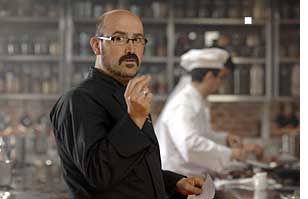 Maxi
(Javier Camara) is the executive chef and owner of a plush restaurant named
Xantarella. He is a middle aged screaming queen who is obsessed with getting
a Michelin star for his elegant eatery. His quirky staff is one big dysfunctional
happy family. Maxi gets a little high strung at times; think Hell's Kitchen's
Gordon Ramsay crossed with ZaZa from La
Cage Aux Folles. But he is also deeply passionate about the food
that comes out of his kitchen and this is how he rapturously describes it
to his staff: Maxi
(Javier Camara) is the executive chef and owner of a plush restaurant named
Xantarella. He is a middle aged screaming queen who is obsessed with getting
a Michelin star for his elegant eatery. His quirky staff is one big dysfunctional
happy family. Maxi gets a little high strung at times; think Hell's Kitchen's
Gordon Ramsay crossed with ZaZa from La
Cage Aux Folles. But he is also deeply passionate about the food
that comes out of his kitchen and this is how he rapturously describes it
to his staff: |
|
|
|
|
Life is about to get complicated for Maxi. His ex-wife from a sham marriage has just died and he suddenly has custody of his two estranged children. He hasn't seen the boy, 15, and the girl, 6, in years and the kids are, shall we say... hostile? A hunky former soccer player named Horacio (Benjamin Vicuna) moves into the apartment across the hall and both Maxi, and his maitre d' Alex (Lola Duenas), fall in lust with him. I have to point out that Alex was earlier seen screaming that she is done with men because they are all pigs. Quickly forgetting her new vow, her attempts to seduce the soccer hunk are as subtle as a train wreck. As it turns out, Horacio is in the closet (he is a television sportscaster) and he and Maxi begin a secret, torrid affair. |
|
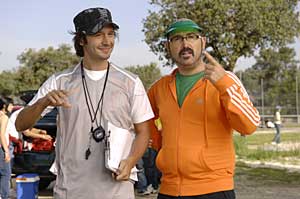 Chef's
Special
is often amusing. Sometimes it's even laugh-out-loud funny. But it is also
a very uneven film. Too many cooks spoil the broth and Chef's
Special has four screenwriters listed. It's the same affliction
suffered by so many Hollywood blockbusters that are written by committee.
Cinema and Sitcom is a bad mix. Beautifully written scenes are followed
by others that are so broad they go beyond slapstick. Director Velilla's
background in television is obvious. I know this is a comedy, but no
one talks the way that these people sometimes do. Many lines are so
out of character that they must have been written just for its laugh value
without giving any thought to character assassination. (Or course, it is
possible that something is lost in the translation.) Chef's
Special
is often amusing. Sometimes it's even laugh-out-loud funny. But it is also
a very uneven film. Too many cooks spoil the broth and Chef's
Special has four screenwriters listed. It's the same affliction
suffered by so many Hollywood blockbusters that are written by committee.
Cinema and Sitcom is a bad mix. Beautifully written scenes are followed
by others that are so broad they go beyond slapstick. Director Velilla's
background in television is obvious. I know this is a comedy, but no
one talks the way that these people sometimes do. Many lines are so
out of character that they must have been written just for its laugh value
without giving any thought to character assassination. (Or course, it is
possible that something is lost in the translation.) |
|
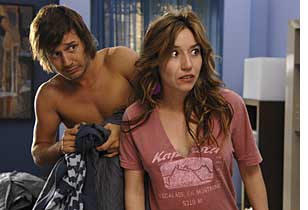 Still,
Spanish comedy is usually a bit on the fast and furious side and maybe we
Americans just can't keep up. Even so, this film really needs to tone it
down a notch. Every now and then, Chef's Special
gets serious and there are a few pretty intense scenes between Maxi and
his son Edu. When Edu is expelled from school for engaging in a bit of fag
bashing, Maxi slaps him and tells the kid that if he has a problem with
fags to take it out on him. It goes without saying that Edu won't
react very well when he discovers that his famous soccer coach is playing
hide the sausage with his Dad. A number of scenes in which Maxi reads to
his daughter at bedtime are touching, without becoming maudlin, because
Maxi gets exasperated when she keeps asking for rational explanations of
the fine plot points in her nursery rhymes. But the drama always becomes
a burlesque again (sometimes without taking a minute to catch its breath)
and what could have been another Bear
Cub (2004) is, instead, a mess. However, I'd be dishonest if I didn't
admit that it is also an entertaining mess. Still,
Spanish comedy is usually a bit on the fast and furious side and maybe we
Americans just can't keep up. Even so, this film really needs to tone it
down a notch. Every now and then, Chef's Special
gets serious and there are a few pretty intense scenes between Maxi and
his son Edu. When Edu is expelled from school for engaging in a bit of fag
bashing, Maxi slaps him and tells the kid that if he has a problem with
fags to take it out on him. It goes without saying that Edu won't
react very well when he discovers that his famous soccer coach is playing
hide the sausage with his Dad. A number of scenes in which Maxi reads to
his daughter at bedtime are touching, without becoming maudlin, because
Maxi gets exasperated when she keeps asking for rational explanations of
the fine plot points in her nursery rhymes. But the drama always becomes
a burlesque again (sometimes without taking a minute to catch its breath)
and what could have been another Bear
Cub (2004) is, instead, a mess. However, I'd be dishonest if I didn't
admit that it is also an entertaining mess. |
|
|
Chef's Special won a few audience awards on the festival circuit so far be it for me to be a wet blanket. It's a cute film with a lot of fun moments, and it's a pleasant enough date movie. Regrettably, it had the potential to be a bit more.
Javier
Camara also appears in:
|
|
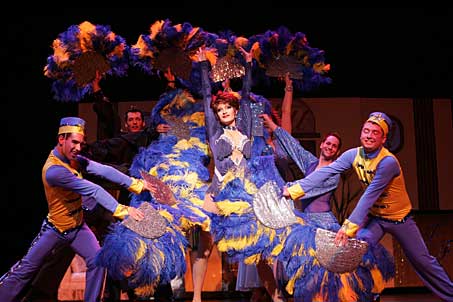 |
|
| Pageant is a feel-good documentary about fifty female impersonators competing for the title of Miss Gay America. Pageant emphasizes the glitz and the glitter, while following five very different men on their individual paths to capture the crown. | |
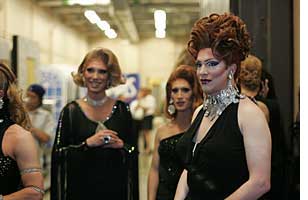 Two
successive title cards begin the film: "The Miss Gay America Pageant is
about the art of illusion" and "The use of female hormones or surgical body
enhancements is forbidden." It is essential that the judges are convinced
that each of the contestants are women and much of Pageant
details the ways in which the men work their magic. This is about female
impersonation and not drag. There are lavish close-ups of makeup being applied,
wigs being styled and dresses being fitted. To add amusement, the audience
also witnesses torturous treatments of duct tape and other household items
that make the illusions possible. Two
successive title cards begin the film: "The Miss Gay America Pageant is
about the art of illusion" and "The use of female hormones or surgical body
enhancements is forbidden." It is essential that the judges are convinced
that each of the contestants are women and much of Pageant
details the ways in which the men work their magic. This is about female
impersonation and not drag. There are lavish close-ups of makeup being applied,
wigs being styled and dresses being fitted. To add amusement, the audience
also witnesses torturous treatments of duct tape and other household items
that make the illusions possible. |
|
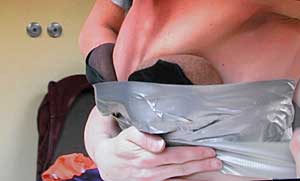 One
of the film's two directors, Stewart Halpern, helmed When
Boys Fly (2000), a documentary about circuit parties that resembled
a more explicit spawn of MTV's The Real World. In Pageant,
Halpern again spotlights, this time with co-director Ron Davis, an interesting
cross section of the contestants. Carl explains that being a female impersonator
has nothing to do with wishing that he was really a woman. As a child, Tony
thought he was ugly until he first put on a dress. Victor is overweight
and his hero is Miss Piggy. Another was once a singer for Jimmy Swaggart
Ministries. One
of the film's two directors, Stewart Halpern, helmed When
Boys Fly (2000), a documentary about circuit parties that resembled
a more explicit spawn of MTV's The Real World. In Pageant,
Halpern again spotlights, this time with co-director Ron Davis, an interesting
cross section of the contestants. Carl explains that being a female impersonator
has nothing to do with wishing that he was really a woman. As a child, Tony
thought he was ugly until he first put on a dress. Victor is overweight
and his hero is Miss Piggy. Another was once a singer for Jimmy Swaggart
Ministries. |
|
|
I have a confession
to make. As a rule, I don't watch talent shows like American Idol or
Project Runway, beauty pageants and drag revues. I own no Barbra Streisand
albums and I hate disco (and yes, I'm really gay even though many friends
think I should turn in my pink card). Even so, I enjoyed watching Pageant
for what it was, and found it quite entertaining. |
|
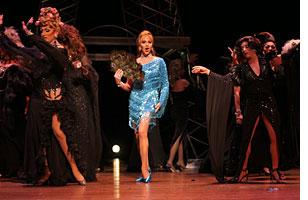 But,
enjoyable as it was, I wanted a little more meat. Pageant
only examines the surface glitter. Aside from a reference to when, three
decades previously, the contestants walked past the Ku Klux Klan and religious
groups with picket signs, small mentions of endured homophobia are noted
only in passing but never fully explored. In 1990, Jennie Livingston's remarkable
Paris is Burning documented the New York Drag Ball scene and its
culture. The mostly poor participants were also living their dreams (and
invented vogue before Madonna) but one came away from that film with a much
deeper sociological context. A young black man, who felt that he would never
escape the slums, found release at the Balls by dressing as a business executive.
There are no comparable insights in Pageant
where most of the contestants seem to be more than comfortably well
off - three of them spend $50,000 to $70,000 on clothes for their hobby. But,
enjoyable as it was, I wanted a little more meat. Pageant
only examines the surface glitter. Aside from a reference to when, three
decades previously, the contestants walked past the Ku Klux Klan and religious
groups with picket signs, small mentions of endured homophobia are noted
only in passing but never fully explored. In 1990, Jennie Livingston's remarkable
Paris is Burning documented the New York Drag Ball scene and its
culture. The mostly poor participants were also living their dreams (and
invented vogue before Madonna) but one came away from that film with a much
deeper sociological context. A young black man, who felt that he would never
escape the slums, found release at the Balls by dressing as a business executive.
There are no comparable insights in Pageant
where most of the contestants seem to be more than comfortably well
off - three of them spend $50,000 to $70,000 on clothes for their hobby. |
|
|
Almost two decades
separate these documentaries. One can watch both and see how more accepting
attitudes are today, and so comparing the two might be unfair. Call me
a wet blanket but I just like movies to have more of an edge. For example,
weren't there any rivalries between some of these guys? |
|
|
More on Stewart Halpern |
|
|
|
|
| A few years ago, I attended an evening of one act plays at the Alleyway Theatre here in Buffalo. The best one featured a school for bitchy theatre critics. The show's biggest laugh came when the teacher gave this hypothetical to her students: "You've just seen a new play by a budding new playwright." Without missing a beat, the entire class shouted in unison: "Needs extensive rewrite!" | |
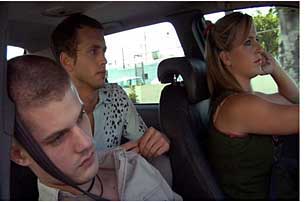 I
bring this up because I found myself thinking about that as I was screening
Holding Trevor (2007), a no-budget
indie directed by Rosser Goodman from a script by Brent Gorski (who also
stars). One minute I would be lost in some pretty intense drama, the next
I would be asking myself if the same man wrote both of the scenes that I
just watched. I
bring this up because I found myself thinking about that as I was screening
Holding Trevor (2007), a no-budget
indie directed by Rosser Goodman from a script by Brent Gorski (who also
stars). One minute I would be lost in some pretty intense drama, the next
I would be asking myself if the same man wrote both of the scenes that I
just watched. |
|
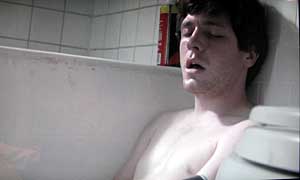 Holding
Trevor
is the story of a young gay man who is trying to move on from a toxic friendship.
Trevor (Gorski) has just found his best friend, Darrell (Christopher Wyllie),
lying against the bathtub and overdosed on heroin... again. Darrell
was Trevor's first boyfriend as a teen-ager. Darrell promises to go straight
but it's difficult to believe him. He is so zonked out on the methadone
and the sleeping pills that the clinic gave him that he might as well still
be a junkie. Darrell is poison and Trevor's friends tell him to dump the
loser and stop feeling responsible for him. Trevor can't let go, but he
has a chance to move on when he meets Ephram (Eli Kranski), a handsome young
medical resident. Can Trevor start over without Darrell getting in the way? Holding
Trevor
is the story of a young gay man who is trying to move on from a toxic friendship.
Trevor (Gorski) has just found his best friend, Darrell (Christopher Wyllie),
lying against the bathtub and overdosed on heroin... again. Darrell
was Trevor's first boyfriend as a teen-ager. Darrell promises to go straight
but it's difficult to believe him. He is so zonked out on the methadone
and the sleeping pills that the clinic gave him that he might as well still
be a junkie. Darrell is poison and Trevor's friends tell him to dump the
loser and stop feeling responsible for him. Trevor can't let go, but he
has a chance to move on when he meets Ephram (Eli Kranski), a handsome young
medical resident. Can Trevor start over without Darrell getting in the way? |
|
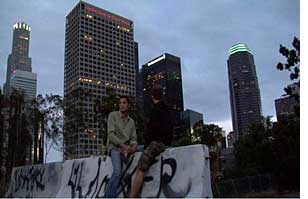 The
film exits the starting gate at a good clip but then the runner stumbles.
Needs extensive rewrite, did I say? Films like this are the hardest for
me to write about. While it is by no means a bad movie,
it still also leaves much to be desired and is often very flat. My interest
was engaged in spurts but the reverie was always broken. Holding
Trevor is strongest when it sticks with Trevor and Darrell
but otherwise it is all over the place. The
film exits the starting gate at a good clip but then the runner stumbles.
Needs extensive rewrite, did I say? Films like this are the hardest for
me to write about. While it is by no means a bad movie,
it still also leaves much to be desired and is often very flat. My interest
was engaged in spurts but the reverie was always broken. Holding
Trevor is strongest when it sticks with Trevor and Darrell
but otherwise it is all over the place. |
|
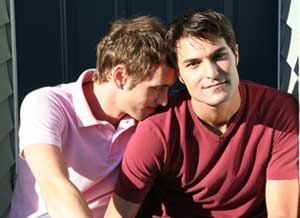 Still,
I can't dismiss the film because of scenes like the unsettling one in which
Darrell, just home from the hospital (and newly enrolled at the clinic)
tries to arouse a clearly reluctant Trevor who can no longer love Darrell
in that way ever again. Darrell is positively manic in this scene and you
can't help but feel sorry for him during these pathetic attempts at seduction.
The film is running on all cylinders during these moments but then repeatedly
grinds to a halt. The writer has no flare for romantic dialogue, weakening
further what is already a tenuous relationship between Trevor and Ephram.
Perhaps that was the point but the writing is too inconsistent. The script
also features some of the most rambling and pointless narrations in recent
memory. "My favorite was "If I could no longer be where I have been, then
at least I could turn my back on where I was headed." Am I missing something? Still,
I can't dismiss the film because of scenes like the unsettling one in which
Darrell, just home from the hospital (and newly enrolled at the clinic)
tries to arouse a clearly reluctant Trevor who can no longer love Darrell
in that way ever again. Darrell is positively manic in this scene and you
can't help but feel sorry for him during these pathetic attempts at seduction.
The film is running on all cylinders during these moments but then repeatedly
grinds to a halt. The writer has no flare for romantic dialogue, weakening
further what is already a tenuous relationship between Trevor and Ephram.
Perhaps that was the point but the writing is too inconsistent. The script
also features some of the most rambling and pointless narrations in recent
memory. "My favorite was "If I could no longer be where I have been, then
at least I could turn my back on where I was headed." Am I missing something? |
|
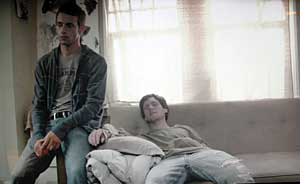 My
attention often wandered but then something would happen - Darrell would
re-enter the picture or the unexpected occured... like when Trevor and his
two roommates get tested for HIV and it is the lady friend who tests
positive. Some of the best friend banter is fun, Eli Kranski as Ephram looks
great with his clothes off, and there are a couple of tender and spicy bedroom
trysts. Trevor and Ephram's first kiss, against a city skyline, was reminiscent
of the poster for Woody Allen's Manhattan. I also liked Trevor's
method of dealing with stress - he screams at the top of his lungs while
taking his car through an automated car wash. My
attention often wandered but then something would happen - Darrell would
re-enter the picture or the unexpected occured... like when Trevor and his
two roommates get tested for HIV and it is the lady friend who tests
positive. Some of the best friend banter is fun, Eli Kranski as Ephram looks
great with his clothes off, and there are a couple of tender and spicy bedroom
trysts. Trevor and Ephram's first kiss, against a city skyline, was reminiscent
of the poster for Woody Allen's Manhattan. I also liked Trevor's
method of dealing with stress - he screams at the top of his lungs while
taking his car through an automated car wash. |
|
 The
acting is mixed. Jay Brannan, as Trevor's bitchy club kid friend Jake, was
much better in John Cameron Mitchell's Shortbus
but here one surmises that he, like the rest of the cast, is giving it his
best while being limited by the lines he is forced to deliver. (As he did
in Shortbus, Brannan performs a very moving song on accoustic guitar.)
Wyllie gives the film's best performance as Darrell. Maybe it is because
he reminds me of actor Billy Mumy (Will Robinson on the original 1960s Lost
in Space). He shares the same wide-eyed innocence and this makes his
performance as a junkie so harrowing. Gorski also nicely conveys the disgust
he feels for his friend's behavior while still being unable, or unwilling,
to let him go. If only the film was able to sustain the same pitch throughout.
Holding Trevor has more than
its share of pleasures, but it does need an extensive rewrite. The
acting is mixed. Jay Brannan, as Trevor's bitchy club kid friend Jake, was
much better in John Cameron Mitchell's Shortbus
but here one surmises that he, like the rest of the cast, is giving it his
best while being limited by the lines he is forced to deliver. (As he did
in Shortbus, Brannan performs a very moving song on accoustic guitar.)
Wyllie gives the film's best performance as Darrell. Maybe it is because
he reminds me of actor Billy Mumy (Will Robinson on the original 1960s Lost
in Space). He shares the same wide-eyed innocence and this makes his
performance as a junkie so harrowing. Gorski also nicely conveys the disgust
he feels for his friend's behavior while still being unable, or unwilling,
to let him go. If only the film was able to sustain the same pitch throughout.
Holding Trevor has more than
its share of pleasures, but it does need an extensive rewrite. |